

How I wrote my PhD thesis in three months
But writing my PhD thesis had to be different, I told myself when I could finally see the finish line. I couldn’t afford to procrastinate . My PhD scholarship was about to expire, I didn’t have the money for a prolonged stay in the UK, and I didn’t want to be on the island anymore. So, I decided I would leave Cardiff in three months, bought a one-way ticket back home, and then opened the folder “PhD stuff” on my laptop. It was thesis o’clock.
Was I mad? Writing a PhD thesis in three months? Others have done it, so it wasn’t impossible. But sure, X is a great writer, Y had a job waiting for him, and was there anything Z couldn’t do? I wasn’t X, Y, or Z, but I couldn’t waste a second on doubting myself. I had all the materials for my dissertation, so it was only a matter of putting everything together.
Here’s how I wrote my PhD thesis in three months (the distilled version, without the doubts, tears, desperation, frustration, panic, revision fatigue, proofreading mania, and so on). I hope you can use some of these tips to speed up your thesis writing process.
Gathered and organized all the materials
I had the literature review, two papers accepted for publication, some reports, and most of the figures , tables, and appendices that would go into my thesis. I started by organizing all the materials I had and completing the missing bits.
Created an outline
Creating an outline for my doctoral dissertation was easy, as I had had three years to think about what it would include. Once I got the outline approved by my thesis advisor, I was ready to start writing.
I could not emphasize more how important it is to create a detailed outline of a PhD thesis. Once you have it, you cannot feel lost on your thesis writing journey. So, all the time you use for creating an outline, revising it, and getting it approved by your thesis advisor will be well worth it.
Wrote the core chapters
My two peer-reviewed papers became the core of my thesis. Writing these two chapters based on my publications was relatively easy, and it gave me momentum.
The third core chapter was harder to write than the previous two. I needed to turn my research into a coherent whole, instead of simply turning a paper into a chapter.
I started by creating a detailed chapter outline. Then, I copied and pasted under each bullet point all the material I wanted to use—figures, tables, maps. Next, I summarized my ideas and then turned each one into a paragraph. Finally, I tied all the paragraphs together using transition sentences. I didn’t stop to worry about repetitions, awkward language, and typos at this point.
Wrote the two easy chapters
Completing the “Geological Setting” and “Data and Methodology” chapters was easy, as I had used this information for presentations and posters throughout my doctoral program. Writing these chapters gave me a confidence boost—the bulk of my thesis was done, or so I thought at the time.
Wrote the introduction
Based on the literature review I already had, I started drafting my introduction, perhaps the most difficult chapter of my thesis. I had too much information and it was poorly structured. But after a lot of rewriting and revising, I managed to create a chapter draft.
Wrote the discussion
No doubt, this was the hardest part of writing my PhD thesis . The discussion had to be the common thread of my three core chapters, which were pretty disconnected to begin with.
I started doing a lot of brainstorming and struggling to draw connections between otherwise disparate ideas. I had to read many papers and books again and look up new information.
At this point my stress levels soared and no place seemed quiet enough to allow me to concentrate. Working from home was out of question, as there were too many distractions (read “snacks and comfortable places to sleep on”). So, instead, I decided to arrive at the office very early and write as much as I could during the quiet hours of the morning. By noon I had usually made good progress, so I would go for a brisk walk to clear my mind. In the afternoon I focused on tasks that demanded little brain power, such as reference formatting.
One more thing I did while I wrote my discussion chapter was not checking my email till after lunch. It’s incredible how much progress I made when I didn’t allow myself to be distracted by new-email notifications.
Wrote the conclusion and abstract
Completing these two parts of my thesis was easy once I had everything else ready.
Revised and edited my PhD thesis
Revising was far more painstaking than I had imagined. I don’t remember how many revision rounds I did, but they were quite a few.
At this point I started having doubts; I could almost picture myself failing my PhD examination. But after the editing stage, my confidence was back. It was a decent thesis, I thought, though it was far from perfect. But it had to be good enough—I was running out of time.
Proofread my PhD thesis
This stage was quite enjoyable, though not as enjoyable as writing thesis acknowledgments . I had fixed the most blatant errors during the editing stage, so proofreading was relatively easy. But as self-proofreading is not foolproof, some errors will remain in my thesis forever.
Formatted the document
I had used MS Word and had many figures and tables, so putting the document together was a hassle. My laptop kept crashing because of the size of the file, and working with styles in Word was a nightmare. Completing this stage was more time-consuming than I had expected, but when it was done it was time to celebrate.
That’s how I wrote my PhD thesis in three months, but it would have been easier if…
I used a reference manager, chose a word processor other than Word, had my thesis professionally proofread, and socialized during these three months instead of living in automaton mode. And it would have been good to know writing always takes longer than you think. Trivial tasks in particular (such as formatting tables) can become time sinks if you don’t put a cap on the number of hours you are willing to dedicate to a task. Also, knowing the law of diminishing returns helps you limit the number of revision rounds you do.
If you find none of the tips above useful, maybe you can use this one: To avoid procrastination when writing your PhD thesis, focus only on the task at hand. Worrying about how people will judge your PhD thesis slows down your progress and adds unnecessary stress to your life.
Does your PhD thesis need editing or proofreading? Send me a message at [email protected].
Related posts:
- The best academic writing books: My list
- PhD dissertation to book: Roadmap and advice for authors
- The art of writing PhD thesis acknowledgments: A guide for economics students
Last revised on 7 September 2022
About Cristina N.
A freelance editor and writer with a keen interest in science, nature, and communication, I love to craft articles that help and inspire people.
Why give detailed instructions to your freelance language editor
Aim: help and inspire people to improve their written communications.
Neagu Raluca-Cristina | VAT Registration Number: IT04535070264
© 2015–2024 Neagu Raluca-Cristina
- PROOFREADING
- TERMS OF SERVICE
- PRIVACY POLICY
- TESTIMONIALS

How to tackle the PhD dissertation
Finding time to write can be a challenge for graduate students who often juggle multiple roles and responsibilities. Mabel Ho provides some tips to make the process less daunting

Created in partnership with

You may also like

Popular resources
.css-1txxx8u{overflow:hidden;max-height:81px;text-indent:0px;} Analytical testing is the key to industry collaborations
Is it time to turn off turnitin, use ai to get your students thinking critically, taming anxiety around public speaking, emotions and learning: what role do emotions play in how and why students learn.
Writing helps you share your work with the wider community. Your scholarship is important and you are making a valuable contribution to the field. While it might be intimidating to face a blank screen, remember, your first draft is not your final draft! The difficult part is getting something on the page to begin with.
As the adage goes, a good dissertation is a done dissertation, and the goal is for you to find balance in your writing and establish the steps you can take to make the process smoother. Here are some practical strategies for tackling the PhD dissertation.
Write daily
This is a time to have honest conversations with yourself about your writing and work habits. Do you tackle the most challenging work in the morning? Or do you usually start with emails? Knowing your work routine will help you set parameters for the writing process, which includes various elements, from brainstorming ideas to setting outlines and editing. Once you are aware of your energy and focus levels, you’ll be ready to dedicate those times to writing.
While it might be tempting to block a substantial chunk of time to write and assume anything shorter is not useful, that is not the case. Writing daily, whether it’s a paragraph or several pages, keeps you in conversation with your writing practice. If you schedule two hours to write, remember to take a break during that time and reset. You can try:
- The Pomodoro Technique: a time management technique that breaks down your work into intervals
- Taking breaks: go outside for a walk or have a snack so you can come back to your writing rejuvenated
- Focus apps: it is easy to get distracted by devices and lose direction. Here are some app suggestions: Focus Bear (no free version); Forest (free version available); Cold Turkey website blocker (free version available) and Serene (no free version).
This is a valuable opportunity to hone your time management and task prioritisation skills. Find out what works for you and put systems in place to support your practice.
- Resources on academic writing for higher education professionals
- Stretch your work further by ‘triple writing’
- What is your academic writing temperament?
Create a community
While writing can be an isolating endeavour, there are ways to start forming a community (in-person or virtual) to help you set goals and stay accountable. There might be someone in your cohort who is also at the writing stage with whom you can set up a weekly check-in. Alternatively, explore your university’s resources and centres because there may be units and departments on campus that offer helpful opportunities, such as a writing week or retreat. Taking advantage of these opportunities helps combat isolation, foster accountability and grow networks. They can even lead to collaborations further down the line.
- Check in with your advisers and mentors. Reach out to your networks to find out about other people’s writing processes and additional resources.
- Don’t be afraid to share your work. Writing requires constant revisions and edits and finding people who you trust with feedback will help you grow as a writer. Plus, you can also read their work and help them with their editing process.
- Your community does not have to be just about writing! If you enjoy going on hikes or trying new coffee shops, make that part of your weekly habit. Sharing your work in different environments will help clarify your thoughts and ideas.
Address the why
The PhD dissertation writing process is often lengthy and it is sometimes easy to forget why you started. In these moments, it can be helpful to think back to what got you excited about your research and scholarship in the first place. Remember it is not just the work but also the people who propelled you forward. One idea is to start writing your “acknowledgements” section. Here are questions to get you started:
- Do you want to dedicate your work to someone?
- What ideas sparked your interest in this journey?
- Who cheered you on?
This practice can help build momentum, as well as serve as a good reminder to carve out time to spend with your community.
You got this!
Writing is a process. Give yourself grace, as you might not feel motivated all the time. Be consistent in your approach and reward yourself along the way. There is no single strategy when it comes to writing or maintaining motivation, so experiment and find out what works for you.
Suggested readings
- Thriving as a Graduate Writer by Rachel Cayley (2023)
- Destination Dissertation by Sonja K. Foss and William Waters (2015)
- The PhD Writing Handbook by Desmond Thomas (2016).
Mabel Ho is director of professional development and student engagement at Dalhousie University.
If you would like advice and insight from academics and university staff delivered direct to your inbox each week, sign up for the Campus newsletter .
Analytical testing is the key to industry collaborations
A framework to teach library research skills, contextual learning: linking learning to the real world, how hard can it be testing ai detection tools, chatgpt’s impact on nursing education and assessments.
Register for free
and unlock a host of features on the THE site

- Manuscript Preparation
Know How to Structure Your PhD Thesis
- 4 minute read
- 34.5K views
Table of Contents
In your academic career, few projects are more important than your PhD thesis. Unfortunately, many university professors and advisors assume that their students know how to structure a PhD. Books have literally been written on the subject, but there’s no need to read a book in order to know about PhD thesis paper format and structure. With that said, however, it’s important to understand that your PhD thesis format requirement may not be the same as another student’s. The bottom line is that how to structure a PhD thesis often depends on your university and department guidelines.
But, let’s take a look at a general PhD thesis format. We’ll look at the main sections, and how to connect them to each other. We’ll also examine different hints and tips for each of the sections. As you read through this toolkit, compare it to published PhD theses in your area of study to see how a real-life example looks.
Main Sections of a PhD Thesis
In almost every PhD thesis or dissertation, there are standard sections. Of course, some of these may differ, depending on your university or department requirements, as well as your topic of study, but this will give you a good idea of the basic components of a PhD thesis format.
- Abstract : The abstract is a brief summary that quickly outlines your research, touches on each of the main sections of your thesis, and clearly outlines your contribution to the field by way of your PhD thesis. Even though the abstract is very short, similar to what you’ve seen in published research articles, its impact shouldn’t be underestimated. The abstract is there to answer the most important question to the reviewer. “Why is this important?”
- Introduction : In this section, you help the reviewer understand your entire dissertation, including what your paper is about, why it’s important to the field, a brief description of your methodology, and how your research and the thesis are laid out. Think of your introduction as an expansion of your abstract.
- Literature Review : Within the literature review, you are making a case for your new research by telling the story of the work that’s already been done. You’ll cover a bit about the history of the topic at hand, and how your study fits into the present and future.
- Theory Framework : Here, you explain assumptions related to your study. Here you’re explaining to the review what theoretical concepts you might have used in your research, how it relates to existing knowledge and ideas.
- Methods : This section of a PhD thesis is typically the most detailed and descriptive, depending of course on your research design. Here you’ll discuss the specific techniques you used to get the information you were looking for, in addition to how those methods are relevant and appropriate, as well as how you specifically used each method described.
- Results : Here you present your empirical findings. This section is sometimes also called the “empiracles” chapter. This section is usually pretty straightforward and technical, and full of details. Don’t shortcut this chapter.
- Discussion : This can be a tricky chapter, because it’s where you want to show the reviewer that you know what you’re talking about. You need to speak as a PhD versus a student. The discussion chapter is similar to the empirical/results chapter, but you’re building on those results to push the new information that you learned, prior to making your conclusion.
- Conclusion : Here, you take a step back and reflect on what your original goals and intentions for the research were. You’ll outline them in context of your new findings and expertise.
Tips for your PhD Thesis Format
As you put together your PhD thesis, it’s easy to get a little overwhelmed. Here are some tips that might keep you on track.
- Don’t try to write your PhD as a first-draft. Every great masterwork has typically been edited, and edited, and…edited.
- Work with your thesis supervisor to plan the structure and format of your PhD thesis. Be prepared to rewrite each section, as you work out rough drafts. Don’t get discouraged by this process. It’s typical.
- Make your writing interesting. Academic writing has a reputation of being very dry.
- You don’t have to necessarily work on the chapters and sections outlined above in chronological order. Work on each section as things come up, and while your work on that section is relevant to what you’re doing.
- Don’t rush things. Write a first draft, and leave it for a few days, so you can come back to it with a more critical take. Look at it objectively and carefully grammatical errors, clarity, logic and flow.
- Know what style your references need to be in, and utilize tools out there to organize them in the required format.
- It’s easier to accidentally plagiarize than you think. Make sure you’re referencing appropriately, and check your document for inadvertent plagiarism throughout your writing process.
PhD Thesis Editing Plus
Want some support during your PhD writing process? Our PhD Thesis Editing Plus service includes extensive and detailed editing of your thesis to improve the flow and quality of your writing. Unlimited editing support for guaranteed results. Learn more here , and get started today!

- Publication Process
Journal Acceptance Rates: Everything You Need to Know

- Publication Recognition
How to Make a PowerPoint Presentation of Your Research Paper
You may also like.

Make Hook, Line, and Sinker: The Art of Crafting Engaging Introductions

Can Describing Study Limitations Improve the Quality of Your Paper?

A Guide to Crafting Shorter, Impactful Sentences in Academic Writing

6 Steps to Write an Excellent Discussion in Your Manuscript

How to Write Clear and Crisp Civil Engineering Papers? Here are 5 Key Tips to Consider

The Clear Path to An Impactful Paper: ②

The Essentials of Writing to Communicate Research in Medicine

Changing Lines: Sentence Patterns in Academic Writing
Input your search keywords and press Enter.
Want to Get your Dissertation Accepted?
Discover how we've helped doctoral students complete their dissertations and advance their academic careers!
Join 200+ Graduated Students

Get Your Dissertation Accepted On Your Next Submission
Get customized coaching for:.
- Crafting your proposal,
- Collecting and analyzing your data, or
- Preparing your defense.
Trapped in dissertation revisions?
How long does it take to write a dissertation, published by steve tippins on july 11, 2019 july 11, 2019.
Last Updated on: 2nd February 2024, 05:00 am
How long does it take to write a dissertation? The most accurate (and least helpful) answer is, it depends. Since that’s probably not the answer you’re looking for, I’ll use the rest of the article to address the realities of how long it takes to write a dissertation.
How Long Does It Take to Write a Dissertation?
Based on my experience, writing your dissertation should take somewhere between 13-20 months. These are average numbers based upon the scores of doctoral students that I have worked with over the years, and they generally hold true.
I have seen people take less time and more time, but I believe that with concerted effort, the 13-20 month timeframe is reasonable.
“Based on my experience, writing your dissertation should take somewhere between 13-20 months.”

University Requirements
Once you hit the dissertation stage, some schools require a minimum number of hours in the dissertation area before you can graduate. Many schools require the equivalent of one year of dissertation credits to graduate.
So, even if you can finish your dissertation in three months, you will still have to pay for nine more months of dissertation credits before you can graduate. However, unless research and writing is your superpower, I wouldn’t worry about having to pay extra tuition.
But this requirement does offer some insight into how long it takes to write a dissertation. Based on this requirement, it’s reasonable to expect that writing your dissertation will take a year of more. This is consistent with my experience.

However, this timeframe is based on several assumptions. First, I am assuming that you are continually working towards finishing your dissertation. This means that no family emergencies, funding conundrums, or work issues get in the way of completing. Second, there are no major changes in your dissertation committee. Third, you will have access to the data that you need.
Assuming these assumptions hold true, this article should give you a general idea of how long it might take to write your dissertation.
How Long Does it Take to Write A Dissertation? Stage-By-Stage
Let’s break down each stage of the dissertation writing process and how long it takes.
Prospectus
This is the hardest one to judge, as this is where you lay the groundwork for the rest of your dissertation and get buy-in from committee members. Normally this takes from 3-6 months. Not all of this is writing time, though–much of it is spent refining your topic and your approach.
Why does this stage take so long? For many people, starting to express themselves using an academic voice can take time. This can hold up the review process as your committee members ask for writing-related revisions before they even get to evaluating the content. Don’t worry, once you learn the academic language things will start to flow more easily.
One common mistake students make is lack of specificity, both in their writing in general and in their topic focus.
Proposal (Chapters 1-3)

Chapter 1 is often an expansion of your Prospectus. However, you’ll be expected to develop your ideas more and have even more specificity on things like your research question and methodology, so don’t underestimate how long this chapter will take.
Chapter 2 can take some time as you will be digging deep into the literature but I think this can be done in 3-4 months. One caution, some people, and committees, like to start with Chapter 2 so that you are immersed in the literature before completing Chapters 1 and 3. Regardless of where you start, 3-4 months is a good estimate.
Chapter 3 requires an in-depth explanation of your methodology. I suggest working closely with your Chair on this one to avoid multiple submissions and revisions. Get clear on your methodology and make sure you and your chair are on the same page before you write, and continue to check in with your chair, if possible, throughout the process.
IRB Approval
While this step can be full of details and require several iterations it seems that allowing 2 months is sufficient. Most schools have an IRB form that must be submitted. To save time you can usually start filling out the form while your committee is reviewing your Proposal.
Collecting Data
This step varies a great deal. If you are using readily available secondary data this can take a week but if you are interviewing hard to get individuals or have trouble finding a sufficient number of people for your sample this can take 4 months or more. I think 1-4 months should be appropriate
Chapters 4 and 5
These two chapters are the easiest to write as in Chapter 4 you are reporting your results and in Chapter 5 you explain what the results mean. I believe that these two chapters can be written in 2 months.

Defense and Completion
You will need to defend your dissertation and then go through all of the university requirements to finalize the completion of your dissertation. I would allow 2 months for this process.
Variables That Affect How Long It Takes to Write A Dissertation
When students say something like, “I’m going to finish my dissertation in three months,” they likely aren’t considering all of the variables besides the actual writing. Even if you’re a fast writer, you’ll have to wait on your committee’s comments,
Timing Issues
Many schools have response times for committee members. This is important when looking at how long it takes to finish a dissertation. For example, it you have two committee members and they each get up to 2 weeks for a review, it can take up to a month to get a document reviewed, each time you submit. So, plan for these periods of time when thinking about how long that it will take you.
Addressing Comments
How long it takes to write your dissertation also depends on your ability to address your committee’s comments thoroughly. It’s not uncommon for a committee member to send a draft back several times, even if their comments were addressed adequately, because they notice new issues each time they read it. Save yourself considerable time by making sure you address their comments fully, thus avoiding unnecessary time waiting to hear the same feedback.

This is the biggest variable in the dissertation model. How dedicated are you to the process? How much actual time do you have? How many outside interests/requirements do you have? Are you easily distracted? How clean does your workspace need to be? (This may seem like a strange thing to discuss, but many people need to work in a clean space and can get very interested in cleaning if they have to write). Are you in a full-time program or in a part time program? Are you holding down a job? Do you have children?
All of these things will affect how much time you have to put into writing–or rather, how disciplined you need to be about making time to write.
One of the things that can influence how long it takes to write your dissertation is your committee. Choose your committee wisely. If you work under the assumption that the only good dissertation is a done dissertation, then you want a committee that will be helpful and not trying to prove themselves on your back. When you find a Chair that you can work with ask her/him which of their colleagues they work well with (it’s also worth finding out who they don’t work well with).
Find out how they like to receive material to review. Some members like to see pieces of chapters and some like to see completed documents. Once you know their preferences, you can efficiently submit what they want when they want it.
How Long Does it Take to Write a Dissertation? Summary
Barring unforeseen events, the normal time range for finishing a dissertation seems to be 13-19 months, which can be rounded to one to one and a half years. If you are proactive and efficient, you can usually be at the shorter end of the time range.

That means using downtime to do things like changing the tense of your approved Proposal from future tense to past tense and completing things like you Abstract and Acknowledgement sections before final approval.
I hope that you can be efficient in this process and finish as quickly as possible. Remember, “the only good dissertation is a done dissertation.”
On that note, I offer coaching services to help students through the dissertation writing process, as well as editing services for those who need help with their writing.
Steve Tippins
Steve Tippins, PhD, has thrived in academia for over thirty years. He continues to love teaching in addition to coaching recent PhD graduates as well as students writing their dissertations. Learn more about his dissertation coaching and career coaching services. Book a Free Consultation with Steve Tippins
Related Posts

Dissertation
What makes a good research question.
Creating a good research question is vital to successfully completing your dissertation. Here are some tips that will help you formulate a good research question. What Makes a Good Research Question? These are the three Read more…

Dissertation Structure
When it comes to writing a dissertation, one of the most fraught questions asked by graduate students is about dissertation structure. A dissertation is the lengthiest writing project that many graduate students ever undertake, and Read more…

Choosing a Dissertation Chair
Choosing your dissertation chair is one of the most important decisions that you’ll make in graduate school. Your dissertation chair will in many ways shape your experience as you undergo the most rigorous intellectual challenge Read more…
Make This Your Last Round of Dissertation Revision.
Learn How to Get Your Dissertation Accepted .
Discover the 5-Step Process in this Free Webinar .
Almost there!
Please verify your email address by clicking the link in the email message we just sent to your address.
If you don't see the message within the next five minutes, be sure to check your spam folder :).
- International edition
- Australia edition
- Europe edition

Finishing your PhD thesis: 15 top tips from those in the know
Trying to complete a PhD thesis in time for the October deadline? We share some advice on getting over that final hurdle
- The key to a successful PhD thesis? Write in your own voice
Many PhD students are now in the final throes of writing their thesis. Turning years of research into a single, coherent piece of work can be tough, so we asked for tips from supervisors and recent PhD graduates. We were inundated with tweets and emails – and @AcademiaObscura helpfully created a Storify of the tweets. Below is a selection of the best tips.
1) Make sure you meet the PhD requirements for your institution “PhD students and their supervisors often presume things without checking. One supervisor told his student that a PhD was about 300 pages long so he wrote 300 pages. Unfortunately the supervisor had meant double-spaced, and the student had written single-spaced. Getting rid of 40,000 extra words with two weeks to go is not recommended.” ( Hannah Farrimond, lecturer in medical sociology, Exeter University)
2) Keep perspective “Everyone wants their thesis to be amazing, their magnum opus. But your most important work will come later. Think of your PhD as an apprenticeship. Your peers are unlikely to read your thesis and judge you on it. They are more likely to read any papers (articles, chapters, books) that result from it.” ( Dean D’Souza, PhD in cognitive neuroscience, Birkbeck, University of London)
3) Write the introduction last “Writing the introduction and conclusion together will help to tie up the thesis together, so save it for the end.” ( Ashish Jaiswal, PhD in business education, University of Oxford)
4) Use apps “ Trello is a project management tool (available as a smartphone app) which allows you to create ‘boards’ on which to pin all of your outstanding tasks, deadlines, and ideas. It allows you to make checklists too so you know that all of your important stuff is listed and to-hand, meaning you can focus on one thing at a time. It’s satisfying to move notes into the ‘done’ column too.” ( Lucy Irving, PhD in psychology, Middlesex University)
5) Address the unanswered questions “There will always be unanswered questions – don’t try to ignore or, even worse, obfuscate them. On the contrary, actively draw attention to them; identify them in your conclusion as areas for further investigation. Your PhD viva will go badly if you’ve attempted to disregard or evade the unresolved issues that your thesis has inevitably opened up.” ( Michael Perfect, PhD in English literature, University of Cambridge)
6) Buy your own laser printer “A basic monochrome laser printer that can print duplex (two-sided) can be bought online for less than £100, with off-brand replacement toners available for about £30 a pop. Repeatedly reprinting and editing draft thesis chapters has two very helpful functions. Firstly, it takes your work off the screen and onto paper, which is usually easier to proof. Secondly, it gives you a legitimate excuse to get away from your desk.” ( James Brown, PhD in architectural education, Queen’s University Belfast)
7) Checking is important “On days when your brain is too tired to write, check quotations, bibliography etc so you’re still making progress.” ( Julia Wright, professor of English at Dalhousie University, Canada)
8) Get feedback on the whole thesis “We often get feedback on individual chapters but plan to get feedback from your supervisor on the PhD as a whole to make sure it all hangs together nicely.” ( Mel Rohse, PhD in peace studies, University of Bradford)
9) Make sure you know when it will end “Sometimes supervisors use optimistic words such as ‘You are nearly there!’ Ask them to be specific. Are you three months away, or do you have six months’ worth of work? Or is it just a month’s load?” ( Rifat Mahbub, PhD in women’s studies, University of York)
10) Prepare for the viva “Don’t just focus on the thesis – the viva is very important too and examiners’ opinions can change following a successful viva. Remember that you are the expert in your specific field, not the examiners, and ask your supervisor to arrange a mock viva if practically possible.” ( Christine Jones , head of school of Welsh and bilingual studies, University of Wales Trinity St David)
11) Develop your own style “Take into account everything your supervisor has said, attend to their suggestions about revisions to your work but also be true to your own style of writing. What I found constructive was paying attention to the work of novelists I enjoy reading. It may seem that their style has nothing to do with your own field of research, but this does not matter. You can still absorb something of how they write and what makes it effective, compelling and believable.” ( Sarah Skyrme, PhD in sociology, Newcastle University)
12) Remember that more is not always better “A PhD thesis is not a race to the highest page count; don’t waste time padding.” ( Francis Woodhouse, PhD in mathematical biology, University of Cambridge)
13) Get a buddy “Find a colleague, your partner, a friend who is willing to support you. Share with them your milestones and goals, and agree to be accountable to them. This doesn’t mean they get to hassle or nag you, it just means someone else knows what you’re up to, and can help to check if your planning is realistic and achievable.” ( Cassandra Steer, PhD in criminology, University of Amsterdam)
14) Don’t pursue perfectionism “Remember that a PhD doesn’t have to be a masterpiece. Nothing more self-crippling than perfectionism.” ( Nathan Waddell, lecturer in modernist literature, Nottingham University )
15) Look after yourself “Go outside. Work outside if you can. Fresh air, trees and sunshine do wonders for what’s left of your sanity.” ( Helen Coverdale, PhD in law, LSE)
Do you have any tips to add? Share your advice in the comments below.
Join the higher education network for more comment, analysis and job opportunities , direct to your inbox. Follow us on Twitter @gdnhighered.
- Universities
- Early career researchers
- Impact of research
- Higher education
Comments (…)
Most viewed.
Emeritus Professor, Edinburgh Napier University

How long does it take to write a PhD thesis?
My short answer is 68 days, but please read the detail below…
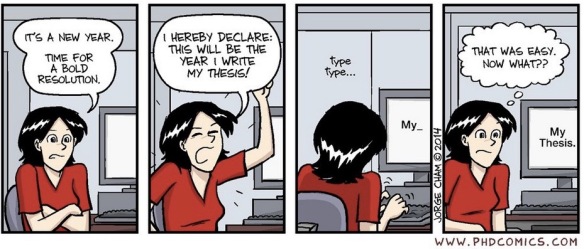
Bold resolutions: “Piled Higher and Deeper” by Jorge Cham www.phdcomics.com
As a PhD supervisor I have often been asked ‘How long do you think it will take me to write up my thesis?’ My answer always begins ‘It depends…’ We then continue the conversation with an audit of material already drafted that may contribute (in edited format) to the final thesis. These include the initial literature review from the first year transfer report, and posters, conference papers and journal articles presented and/or published from the on-going work.
For example third year PhD student John Mowbray , who is currently based within the Centre for Social Informatics (CSI) at Edinburgh Napier University , has a strong basis for his literature review chapter in the form of a conference paper delivered at CoLIS 2016 , which is due to be published in full in Information Research later this year. Similarly John’s fellow student Frances Ryan has already published an account of research design for her study. This paper will underpin the writing of her methods chapter.
Then we consider less formal sources, such as any discussions or debates that the student has documented publicly elsewhere, for example in blog posts. See, for instance Lyndsey Jenkins ‘ recent thoughts about the importance of research domain at http://lyndseyjenkins.org. These may well contribute to a section of Lyndsey’s methods chapter when she comes to write up her work in 2018.
The students also have ‘non-public’ material about their work that will be adapted for their theses. These include interim reports for their supervisors and/or other stakeholders. For example, last semester CSI PhD student Iris Buunk wrote a report on some of the empirical work that she has conducted for the body that gave her access to survey respondents. Handwritten ideas and remarks kept in notebooks over the course of PhD registration are also very valuable ‘private’ resources.
Once we have completed this audit, the challenge of transforming all the work completed to date into an 80,000 word thesis appears not to be so great – but of course, it still all needs to be done!
Records from writing up my own PhD have also recently served as another source for answering questions about preparing the main output of the doctoral study. I undertook my PhD part-time over a period of just over four years while working full-time. Throughout this period there were weeks when I could not progress my work at all. This was largely due to other commitments in intensive periods related to teaching such as the marking season towards the end of each semester. There were other times when it was much easier to devote myself to my PhD. For example, I took annual leave in University vacation time for this purpose (rather than went away on holiday). To guard against losing track of my PhD at times when I was too busy to devote any time to it I kept detailed notes of my progress. As a result of this, I know exactly how much time I spent writing up each chapter for the final version of the thesis. Although all PhD theses are different, the proportion of time on each type of chapter may be helpful to those who have resolved to submit their theses in 2017.
In total it took me 68 days to write up my thesis (NB 68 to write up the work, not 68 days to complete the PhD!) This is the equivalent of approximately 14 working weeks, assuming a five day week. It needs to be borne in mind, however, that I was a part-time student. In practice the writing up was done over the last seven months of the four and half years in which I worked on the entire doctoral study.
The largest portion of the writing-up time – around three quarters – was spent on the two chapters that related the findings of my research, and about a fifth on the discussion chapter. My literature review took very little time to write up (just 5 days) because I had already presented much of it in published form. The methods and conclusions chapters did not take very long either (3.5 and 2.5 days respectively) largely because their content was straightforward. My introductory chapter was very short at a page and a half and was thus drafted in just a couple of hours.
As might be deduced from the time allocations given above, I found the results and discussion chapters most heavy-going. The former was due to the quantity of empirical data to convert into a fluent account of the findings, and the latter because of the intellectual challenge of expressing the meaning of the findings and how the outcomes of my study represented an original contribution to the domain. However, once these two elements were ‘cracked’ it was a relatively easy task to pull all the other chapters together.
If you are reading this blog post as a PhD student in the later stages of your work, I would advise you to be prepared for the long haul of writing up your results and the discussion chapters, and ensure that you allocate a high proportion of your write-up time to these accordingly. It is also worth noting that I found that the closer I came to the target of completing my write-up, the more important it was for me to avoid other distractions. You cannot control for all of them (for example, illness), but I would caution against getting actively involved in anything that will take you away from your PhD at this intensive stage, such as planning a big event (for example, a major holiday, a house move, or a family wedding) or starting a new job.
If you are still in the early stages of your doctoral study, my first piece of advice is to plan your conference participation and journal paper publishing activity with the final thesis in mind. Be selective and strategic so that you prioritise engagement in external events that are valuable to the completion of your thesis and/or your future career. Each piece of work that you present externally should progress your study by encouraging you to write-up as you go along (for example in the form of a poster, a set of slides, a full paper), defend your ideas in person within your academic community, seek feedback on work completed to date, and solicit advice on the later stages. You should also be documenting any thoughts or ideas that may be valuable to writing up in a format that make sense to you, whether this be in a set of handwritten notes or in a more public format such as a series of structured blog posts.
Good luck to all those who will submit their theses in 2017!
Share this:
Leave a comment cancel reply.

- Already have a WordPress.com account? Log in now.
- Subscribe Subscribed
- Copy shortlink
- Report this content
- View post in Reader
- Manage subscriptions
- Collapse this bar
Planning your PhD research: A 3-year PhD timeline example
Planning out a PhD trajectory can be overwhelming. Example PhD timelines can make the task easier and inspire. The following PhD timeline example describes the process and milestones of completing a PhD within 3 years.
Elements to include in a 3-year PhD timeline
The example scenario: completing a phd in 3 years, example: planning year 1 of a 3-year phd, example: planning year 2 of a 3-year phd, example: planning year 3 of a 3-year phd, example of a 3 year phd gantt chart timeline, final reflection.
Every successful PhD project begins with a proper plan. Even if there is a high chance that not everything will work out as planned. Having a well-established timeline will keep your work on track.
What to include in a 3-year PhD timeline depends on the unique characteristics of a PhD project, specific university requirements, agreements with the supervisor/s and the PhD student’s career ambitions.
For instance, some PhD students write a monograph while others complete a PhD based on several journal publications. Both monographs and cumulative dissertations have advantages and disadvantages , and not all universities allow both formats. The thesis type influences the PhD timeline.
Furthermore, PhD students ideally engage in several different activities throughout a PhD trajectory, which link to their career objectives. Regardless of whether they want to pursue a career within or outside of academia. PhD students should create an all-round profile to increase their future chances in the labour market. Think, for example, of activities such as organising a seminar, engaging in public outreach or showcasing leadership in a small grant application.
The most common elements included in a 3-year PhD timeline are the following:
- Data collection (fieldwork, experiments, etc.)
- Data analysis
- Writing of different chapters, or a plan for journal publication
- Conferences
- Additional activities
The whole process is described in more detail in my post on how to develop an awesome PhD timeline step-by-step .
Many (starting) PhD students look for examples of how to plan a PhD in 3 years. Therefore, let’s look at an example scenario of a fictional PhD student. Let’s call her Maria.
Maria is doing a PhD in Social Sciences at a university where it is customary to write a cumulative dissertation, meaning a PhD thesis based on journal publications. Maria’s university regulations require her to write four articles as part of her PhD. In order to graduate, one article has to be published in an international peer-reviewed journal. The other three have to be submitted.
Furthermore, Maria’s cumulative dissertation needs an introduction and conclusion chapter which frame the four individual journal articles, which form the thesis chapters.
In order to complete her PhD programme, Maria also needs to complete coursework and earn 15 credits, or ECTS in her case.
Maria likes the idea of doing a postdoc after her graduation. However, she is aware that the academic job market is tough and therefore wants to keep her options open. She could, for instance, imagine to work for a community or non-profit organisation. Therefore, she wants to place emphasis on collaborating with a community organisation during her PhD.
You may also like: Creating awesome Gantt charts for your PhD timeline
Most PhD students start their first year with a rough idea, but not a well-worked out plan and timeline. Therefore, they usually begin with working on a more elaborate research proposal in the first months of their PhD. This is also the case for our example PhD student Maria.
- Months 1-4: Maria works on a detailed research proposal, defines her research methodology and breaks down her thesis into concrete tasks.
- Month 5 : Maria follows a short intensive course in academic writing to improve her writing skills.
- Months 5-10: Maria works on her first journal paper, which is based on an extensive literature review of her research topic. At the end of Month 10, she submits the manuscript. At the same time, she follows a course connected to her research topic.
- Months 11-12: Maria does her data collection.
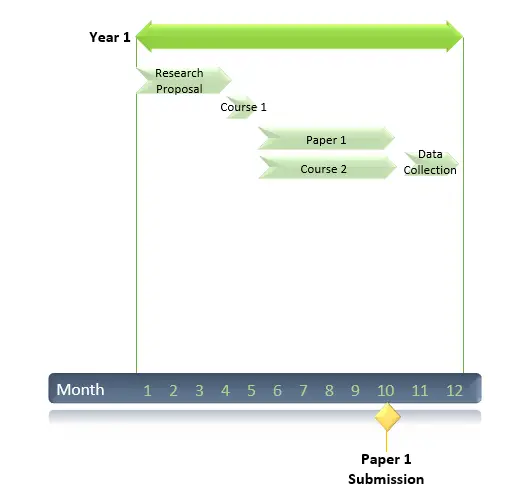
Maria completed her first round of data collection according to plan, and starts the second year of her PhD with a lot of material. In her second year, she will focus on turning this data into two journal articles.
- Months 1-2: Maria works on her data analysis.
- Months 3-7: Maria works on her second journal paper.
- Month 7: Maria attends her first conference, and presents the results of her literature-review paper.
- Month 8: Maria received ‘major revisions’ on her first manuscript submission, and implements the changes in Month 8 before resubmitting her first journal paper for publication.
- Month 9: Maria follows a course on research valorisation to learn strategies to increase the societal impact of her thesis.
- Months 9-12: Maria works on her third journal paper. She uses the same data that she collected for the previous paper, which is why she is able to complete the third manuscript a bit faster than the previous one.
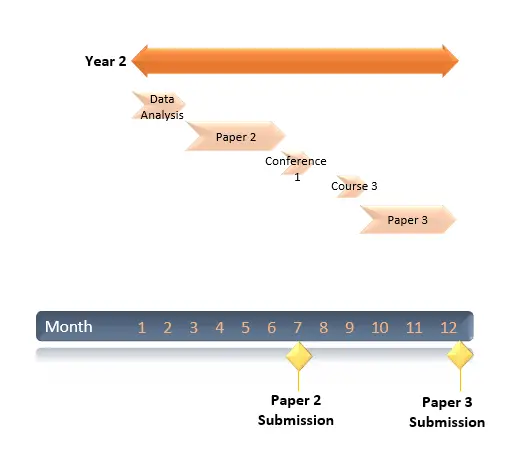
Time flies, and Maria finds herself in the last year of her PhD. There is still a lot of work to be done, but she sticks to the plan and does her best to complete her PhD.
- Month 1: Maria starts a second round of data collection, this time in collaboration with a community organisation. Together, they develop and host several focus groups with Maria’s target audience.
- Month 2: Maria starts to analyse the material of the focus group and develops the argumentation for her fourth journal paper.
- Month 3: Maria presents the results of her second journal paper at an international conference. Furthermore, she helps out her supervisor with a grant application. They apply for funding to run a small project that is thematically connected to her PhD.
- Months 4-9: Maria writes her fourth and final journal article that is required for her PhD.
- Month 10: Maria writes her thesis introduction .
- Month 11: Maria works on her thesis conclusion.
- Month 12 : Maria works on the final edits and proof-reading of her thesis before submitting it.
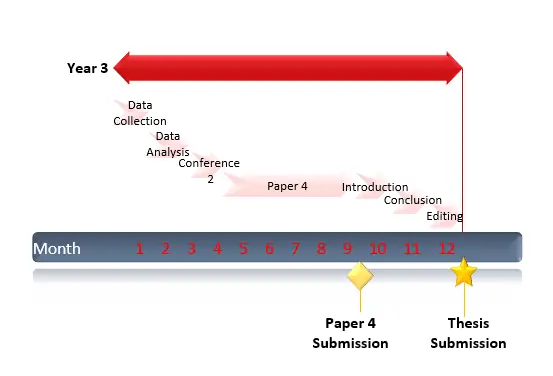
Combining the 3-year planning for our example PhD student Maria, it results in the following PhD timeline:
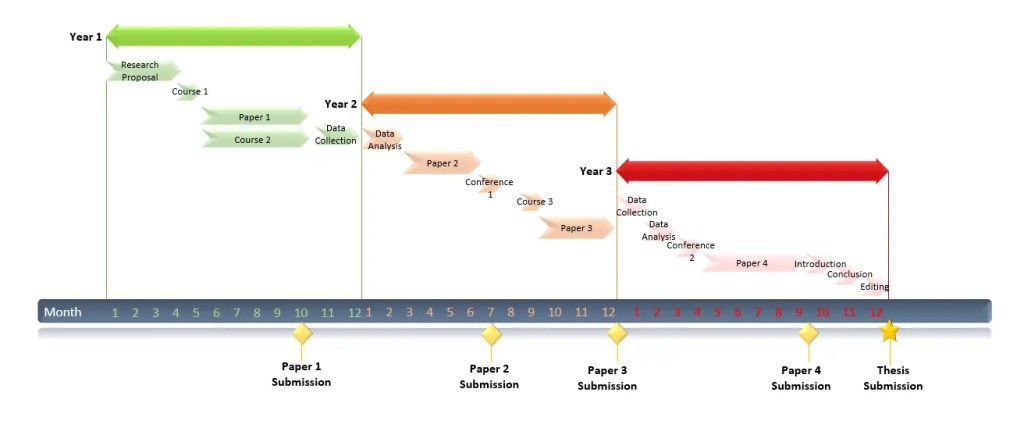
Creating these PhD timelines, also called Gantt charts, is easy. You can find instructions and templates here.
Completing a PhD in 3 years is not an easy task. The example of our fictional PhD student Maria shows how packed her timeline is, and how little time there is for things to go wrong.
In fact, in real life, many PhD students spend four years full-time to complete a PhD based on four papers, instead of three. Some extend their studies even longer.
Furthermore, plan in some time for thesis editing, which is a legitimate practice and can bring your writing to the next level. Finding a reputable thesis editor can be challenging, so make sure you make an informed choice.
Finishing a PhD in 3 years is not impossible, but it surely is not easy. So be kind to yourself if things don’t work out entirely as planned, and make use of all the help you can get.
Master Academia
Get new content delivered directly to your inbox.
Subscribe and receive Master Academia's quarterly newsletter.
10 amazing benefits of getting a PhD later in life
How to prepare your viva opening speech, related articles.

Writing a successful academic CV (and a free template)

25 short graduation quotes: Inspiration in four words or less

9 smart questions to ask a professor about graduate school
8 Tips to Write a Thesis in 30 Days (Bonus Tip Included)
Every student wants to know how to write a thesis in a month . Before sharing the tips that I’ve used in my writing journey, we first need to ask: is it possible to write a thesis in one month, and actually finish it? The answer to this question is yes! You absolutely can write a thesis in 30 days. And you can write your thesis, from start to finish, without the emotional distress that often comes with such a monumental task. And, before you ask, no you’re not going to pay anybody to write a thesis for you. You’re going to write your thesis by yourself.
I’ve written two Masters’ theses, a PhD dissertation and a draft of a book. Here are the 8 tips that have helped me write my thesis as quickly as possible and get to the other side.
3.1 Use Grammarly: An Online Writing Assistant
My 8 tips on how to write a thesis or dissertation in a month.
Before we start, let me say that no one is born knowing how to write a thesis. My professors were not born knowing how to write a thesis and I wasn’t born knowing how to write a thesis either.
I learned how to write a thesis. It was not easy, and I struggled a lot in writing my first thesis. That’s until I discovered what I needed to do to push through and finish writing it.
I then used those lessons and applied them to my second thesis and every writing assignments since then. Writing became fun.
In fact, I was having so much fun writing my second thesis that I took on extra writing assignments. Hence the birth of this blog.
1. Adjust Your Expectations
If you want to finish writing your thesis in a month, the first thing you need to recognize is that you don’t need to break new grounds in your thesis for your thesis to be acceptable.
If for some reason you think you need to break new grounds, then you need to quickly adjust your expectations. The point of a thesis is to demonstrate mastery of the literature and show that you’re able to competently synthesize and present those works persuasively.
That’s all you need to do.
If you’re aiming for more, then consider these two points:
- You don’t have the advanced training or the experience yet to “contribute” to the field. It’s certainly not impossible, but that’s not what’s expected of you in your M.A thesis (and even in your PhD thesis). In fact, if you can just slightly “advance” the research, that’s considered a great accomplishment!
- You need much longer than 30 days or 3 months or even 3 years to come up with something new. Why? Because you need to read literally everything on your subject. And that’s what you’re expected to do when you’ve already finished writing your thesis, and decided to pursue an academic career.
For these two reasons, I think it’s best to view your thesis as something that reflects what you’ve been trained to do, which is to write a good thesis using the skills you already have. You are enough and you probably already have what it takes to write your thesis. So don’t be too hard on yourself. Think of this: Just like you can’t run a marathon if you’ve been training for a 5k, you also can’t “contribute to the field” when you’re still in the process of being trained on how to write a thesis. Most probably, this is your first time writing a masters degree thesis, so take it easy. (More on writing a PhD dissertation below).
So, adjust your expectations accordingly.
Now, if you are trying to write your PhD thesis in a month, let me first say that it’s almost impossible. But if you have certain circumstances (say like a serious illness), then talk to your advisor about it and see what he/she suggests.
2. Don’t Be a Perfectionist
A professor once told me, if you want to write a perfect thesis, “you will never finish writing.” And he was right. I can’t begin to tell you just how much time I wasted trying to write a flawless thesis (AHHH!). In the end, it was not worth it. I ended up procrastinating and wasting time. I wish I could have that time back. Please, don’t make the same mistake I made.
After that emotionally draining experience, I changed my approach. I strove to write something good (and not perfect). I then got feedback on my ideas from my professors and went back and made them better. Eventually, they were, in my eyes, perfect. I was happy.
If you still think you need to be a perfectionist, consider this: there’s always more you can say about your topic. There are more examples you can discuss, more evidence to support your arguments with, and there is an infinite number of ways to organize your ideas, paragraphs and chapters to eventually turn your thesis into a “masterpiece.” You literally can go on forever writing and re-writing your thesis.
If you’re tight on time and you want to finish writing your thesis in 30 days, then do yourself a favor and focus on being done . Write something that’s good enough and move on knowing that you will get back to it later.
So stop fixing things day in and day out. The goal is to make linear progress every single day until you’re done.
Remember, a mediocre finished thesis is better than a perfect unfinished one.
3. Take the 80/20 Rule Seriously
Each writing assignment will take you as much time as you’re willing to give it.
So if you give yourself 10 hours to write what usually takes 2 hours, then you will spend 10 hours working on it.
And the opposite is true.
If you have an assignment that usually takes 10 hours to finish, and I give you 2 hours to work on it, you will probably finish it in 2 hours.
On this basis, if you want to write your thesis in 30 days, you have to decide that 30 days is all you have to finish writing it. Be firm about this deadline, and work with the aim of finishing.
To help speed up the writing process, you can benefit from using a powerful writing assistant like Grammarly . ( Disclosure : these are affiliate links which means I will receive a commission if you make a purchase using my referral links.) Please know that I only talk about services that I believe in and can stand behind. And this is one of those amazing products that can be of tremendous benefit to you if you are looking to get over writer’s block and avoid unnecessary slowdowns .
Okay, so quickly: what should you expect from Grammarly?
Grammarly can help save you a lot of time – especially when you are stuck looking for the right word, or the right way to phrase a sentence. Grammarly gives you a list of context-specific vocabulary suggestions/enhancements/corrections and allows you to make an informed decision about what’s best in your specific writing context. This makes your writing flow better and allow you to move forward at a faster rate.
Here are testimonies by students about how Grammarly has helped them with writing their thesis.

Just downloaded Grammarly for the first time and it has transformed my essays. I sound so smart! #Grammarly #Student — Lucy Jade ANutr (@lucyj_nutrition) March 2, 2019
#WhiteSmoke online editor combined with #Grammarly Chome extension..genius… Why didn't I discovered that earlier #Writing #Thesis #PhD — Quirina de Ruiter (@QuirinaDeRuiter) June 28, 2016
Here are some statistics on how Grammarly has helped students and writers get better results.

With Grammarly, you don’t have to worry about proofreading. It will do that for you. You don’t have to worry about manually checking for plagiarism , style, punctuation, and even wordiness. Grammarly can help you do all of that and will also offer explanations for the reasoning behind each correction.

You can also use Grammarly for better and more professional sounding emails – especially when you want to email your advisor and your committee. You can also use Grammarly across pretty much all of your social media platforms including twitter, facebook, linkedin and more.

In order to get access to all the tools that will help you write your thesis efficiently, I recommend their premium plan . The total cost comes out to 2 – 3 cups of cappuccinos… it’s worth it.
4. Don’t Reinvent the Wheel
Here’s a dose of realism.
As original as you would like to be in your thesis, someone has already written on your topic… and that’s a great thing!
Someone has read the same sources, summarized them and put them in their literature review. You can save yourself a whole lot of time by reading literature reviews. There, you will see exactly how they used those sources and how they might fit into your work. Consult the original sources briefly, but as much as necessary to get the main ideas out of them, and move on.
A literature review shouldn’t take you more than a week to complete if you plan to finish writing in 30 days, and that’s totally doable.
5. Complete a Quick First Draft
The fastest way to finish writing is to write quickly…duh.
What I mean by that is if you’re stuck and you can’t quite round up the paragraph or idea you’re working on, don’t dwell on it. Move on to other topics within your thesis and write them out.
The most helpful tip that I can share with you is to force yourself to write a quick high school draft (first draft) of the entire thesis. Go all the way through until you have a completed first draft of your thesis in your hands.
This is going to be tremendously helpful for your progress because if you can see the conclusion of your thesis, you will a have better sense of which parts of your thesis need work, and which parts need to be completely cut out.
In fact, that’s, in my opinion, the only way to know what your thesis really needs. I say this because imagine if you had spent tens of hours fixing a paragraph only to discover later on (or be told by your advisor) that you really don’t need it.
Let me tell you, it freakin sucks!
6. Journal Articles Are Your Best Friend
Journal articles are usually less than 25 pages in length and sometimes even less than 15 pages long. The best part about them: they’re succinct. You can pretty much read the abstract and you’ll know exactly what the main argument is and the strategy of the paper.
All you need to do then is to look for the evidence in the paper itself. It shouldn’t take you anything more than 3 hours to get this information out of the paper. And when you get good at this, it will take you even less than 3 hours.
Moreover, journal articles are a great way to help position your thesis within the literature on the topic, and you will have a much clearer destination when you do so.
See my post on how to read faster .
7. Write (Your Thesis) Everywhere
If you’ve been following my blog, then you know that I champion using free time effectively.
Plan to read or write everywhere : whether you’re waiting on a friend, waiting for the bus, or eating lunch. It will help you address what I’ve called elsewhere as the “familiarity deficit.” Read that post here . Don’t underestimate the value of that time. It will give you a much needed head-start when it’s time to sit down and work on the relevant chapter within your thesis.
The key to finishing your thesis in 30 days is to keep writing even when you don’t feel you’ve got much to say. It will come to you, just don’t give up too soon.
If you experience some mental roadblocks and you’re dealing with procrastination, then give this article a quick read to help you overcome procrastination and take action.
8. Bonus Tip – Join Online Writing Communities
Yes. Join online writing communities. They’re free and you will get a whole lot of support from people who are going through the same thing. Try Phinished . I’ve used it when I wrote my first thesis and it helped me a bunch.
I need to caution that it is easy to spend a lot of time on Phinished reading what others have to say. You might find yourself reading page after page about the challenges others are going through: including what they’re doing to move through the process, and how far they are in their thesis writing.
If you want to finish, then use it with the intention to finish and not to waste more time or procrastinate.
Hope this will help you finish your thesis in 30 days!
Privacy Overview
RIT graduate pursues Ph.D. across time zones

Nastaran Nagshineh, center, defended her Ph.D. thesis at RIT in April. Faculty from RIT’s Rochester and Dubai campuses served on her thesis committee and include, from left to right, Kathleen Lamkin-Kennard, Steven Weinstein, Nathaniel Barlow, and David Kofke (a professor at the University at Buffalo). Mohamed Samaha participated remotely and appears on the video screen behind the group and alongside Nagshineh’s picture.
Nastaran Nagshineh is one of the first Ph.D. candidates to bridge RIT’s Rochester and Dubai campuses. Her accomplishment creates a path for future students at the university’s international campuses.
Nagshineh completed her Ph.D. in mathematical modeling while working full time as a mathematics lecturer at RIT Dubai in the United Arab Emirates, teaching as many as five classes a semester. She described her Ph.D. journey as “an exercise in perseverance” due to competing demands and long days. Rochester is eight hours behind Dubai, and the time difference meant many late-night classes and meetings.
“I saw this collaboration as an opportunity, rather than as a challenge, because my primary adviser, Dr. Steven Weinstein (RIT professor of chemical engineering), and my co-adviser, Dr. Mohamed Samaha (RIT Dubai associate professor of mechanical engineering), both have the same area of research interest,” she said. “They both worked toward my success.”
Nagshineh is one of 67 RIT Ph.D. students who defended their thesis this academic year and who will earn their doctorate. RIT awarded 63 Ph.D. degrees in 2023.
In 2020-2021, RIT’s Graduate School met and surpassed the university’s goal of conferring 50 Ph.D. degrees during an academic year. That number will continue to grow as students cycle through the seven new Ph.D. programs that RIT has added since 2017, said Diane Slusarski , dean of RIT’s Graduate School.
Meeting these goals puts RIT on a path toward achieving an “R1,” or research-intensive designation, from the Carnegie Classification of Institutions of Higher Learning. RIT is currently ranked as an R2 institution . Many factors go into changing a university’s status, including research investment and maintaining a three-year average of 70 Ph.D. degrees awarded per year, according to Slusarski.
“We have met the goals of the strategic plan, and now we look forward to contributing to the research innovation in the future,” Slusarski said. “We want to help the new programs thrive and win national research awards.”
RIT’s emphasis on high-level research is seen in Nagshineh’s Ph.D. work. She applies mathematical modeling to the field of fluid dynamics. Her research has been published in top-tier journals and has gained notice, said Weinstein, her thesis adviser.
Weinstein describes Nagshineh’s accomplishments as “a testament to a fantastic work ethic and commitment” and is inspirational to younger students at Rochester and Dubai.
“The collaboration between RIT Dubai/Rochester has continued,” he said. “Another paper was submitted a few weeks ago with Mohamed Samaha and Nate Barlow (RIT associate professor in the School of Mathematics and Statistics) as co-authors, as well as Cade Reinberger, a younger Ph.D. student in my research group.”
Mathematical modeling is one of RIT’s newer Ph.D. degree programs, and Nagshineh is among its earliest graduates. The program has doubled in size since it began accepting students in 2017, Slusarski said. This past fall, the mathematical modeling program had 35 students, with two graduating this year.
Altogether, RIT has 13 Ph.D. degree programs currently enrolling 438 students, with computing and information sciences accounting for the largest with 117 students. RIT’s other Ph.D. programs include astrophysical sciences and technology , biomedical and chemical engineering , business administration , color science , electrical and computer engineering, imaging science , mechanical and industrial engineering , microsystems engineering , and sustainability .
New programs in cognitive science and physics will launch in the fall.
The growth in RIT graduate education—with more than 3,000 master’s and doctoral students—reflects a demographic change in the student population, Slusarski said. “We have a higher percentage of women in the graduate programs than we have for RIT undergraduate programs.”
RIT’s graduate programs enroll 42 percent women, according to Christie Leone , assistant dean for the Graduate School.
Nagshineh, who also holds an MS in electrical engineering from RIT Dubai, welcomes her role as a mentor to other women students on both campuses.
“As a young woman in an Arabic country, the power of women is often underestimated and undervalued, and I hope to serve as a role model to female students, especially those that question their path,” Nagshineh said.
She plans to continue in her career as a professor and a researcher. “I would like to pursue a research program where I can advise my own students and teach them more deeply.”
Recommended News
May 10, 2024

Design icon Patricia Moore inspires RIT graduates to embrace change and forge paths of impact
While sharing insights from her own transformative journey, Patricia Moore, a distinguished designer and trailblazing alumna of the class of 1974, encouraged this year’s RIT graduates to embrace the challenges and opportunities that lie ahead and answer the call for change.

Bright Spot: Inspiration for young scholars
WHAM-TV features Katrina Overby, assistant professor in the School of Communication, as its Bright Spot.
May 8, 2024

More than monarchs: Red admirals appear in Rochester with spring
The Democrat and Chronicle talks to Kaitlin Stack Whitney, assistant professor in the Department of Science, Technology, and Society, about the early arrival and habits of the red admiral butterfly in Monroe County, highlighting its migration patterns, habitat range, and behavior.
May 7, 2024

Comics go to College
The comics collection at RIT is growing by leaps and bounds and the new Kubert Lounge and Gallery makes it a visible presence on campus. The interdisciplinary art form is right at home at RIT.

IMAGES
VIDEO
COMMENTS
7. Targets and consistency. I set myself a target of 3 months, broken down into targets for each chapter. This would give me about 3 months in reserve before the final absolute deadline. I had a daily minimum target of 500 words, which I knew I could meet even on the least productive days.
+ T I M E S T A M P S 01:35 Starting points02:01 Writing order04:52 Producing raw data (get out of the lab!)05:31 Setting targets 06:30 Editing 07:16 Chec...
Instead of inserting "work on thesis" into your calendar, insert measurable goals like "finish Figure 1" or "write two pages of Chapter 2.". 7. Write In Very Short Bursts. Writing in several short bursts is more efficient than writing in a few, long extended periods of time. If you ever tried to write for several hours in a row, you ...
https://phd.academy/blog/how-i-wrote-a-phd-thesis-in-3-monthsHere's the paper that came from my accidental discovery: https://www.worldscientific.com/doi/abs...
2. Finding the Right Thesis Topic. It is a subject that you have to determine the boundaries of in a boundless universe. The subject of the thesis must be about a specific topic, not a general one ...
How I wrote a PhD thesis in just 3 months: https://jameshaytonphd.com/quick-tips/how-i-wrote-a-phd-thesis-in-3-monthsThe PhD Academy: https://www.phd.academy
Prioritize sleep and exercise. Work smartly. Plan, reflect, and adapt. 1. Commit publicly. The first thing to do is to decide on a realistic date. The emphasis is on realistic. Make sure that you ...
Wrote the core chapters. Wrote the two easy chapters. Wrote the introduction. Wrote the discussion. Wrote the conclusion and abstract. Revised and edited my PhD thesis. Proofread my PhD thesis. Formatted the document. That's how I wrote my PhD thesis in three months, but it would have been easier if….
The PhD thesis is the most important part of a doctoral research degree: the culmination of three or four years of full-time work towards producing an original contribution to your academic field. Your PhD dissertation can therefore seem like quite a daunting possibility, with a hefty word count, the pressure of writing something new and, of ...
Academic writing does not have to be dry. Inject some flair into your work. Read advice on writing and remember George Orwell's words in Why I Write: "Never use the passive where you can use the active"; and Mark Twain's on adjectives: "When you catch an adjective, kill it." If you prefer, Stephen King said: "The road to hell is ...
Make an outline and a schedule, then follow the schedule. Include time for revision and feedback in your schedule. If you know all the content already, the writing can be done much faster than that. In my field, it is only necessary to write about 90 generously spaced pages, so three months is less than a page a day.
10. Taking time over details that matter. I took careful care over the clarity of the writing, the diagrams and thus the look of the thesis. If a diagram took a pair of hours, so be it. If i ...
Those final few months are tough - there is no way around that - but for me they were also the most rewarding part of the entire PhD. In the final stages of thesis writing, everything happens fast: all of a sudden, chapters go from being drafts to being finished; you find a place for the pesky bit of evidence that needed to be included but ...
FIGURE 8. EndNote's Cite While You Write function. 2) Intermediate documents: the thesis/dissertation proposal and grant applications. Think of your thesis or dissertation proposal and any grant applications as being a big first step toward the first chapter of your final document: the introduction.
The Pomodoro Technique: a time management technique that breaks down your work into intervals. Taking breaks: go outside for a walk or have a snack so you can come back to your writing rejuvenated. Focus apps: it is easy to get distracted by devices and lose direction.
Work with your thesis supervisor to plan the structure and format of your PhD thesis. Be prepared to rewrite each section, as you work out rough drafts. Don't get discouraged by this process. It's typical. Make your writing interesting. Academic writing has a reputation of being very dry.
Barring unforeseen events, the normal time range for finishing a dissertation seems to be 13-19 months, which can be rounded to one to one and a half years. If you are proactive and efficient, you can usually be at the shorter end of the time range.
8) Get feedback on the whole thesis. "We often get feedback on individual chapters but plan to get feedback from your supervisor on the PhD as a whole to make sure it all hangs together nicely ...
So, if you've done with the research, and is just outstanding around 50-60 percent of the write-up, I believe 3 months is totally doable. For context, I'm in the humanities field so if you're in a profoundly different field, things may be different. 5.
I procrastinated 3 months away and did 90% of the research and writing in about one month for my 40 page minimum master's thesis. You can see a flurry of activity on my github in the 1-1.5 weeks of writing. I'm now doing a PhD straight out of my master's. You'll be okay.
In total it took me 68 days to write up my thesis (NB 68 to write up the work, not 68 days to complete the PhD!) This is the equivalent of approximately 14 working weeks, assuming a five day week. It needs to be borne in mind, however, that I was a part-time student. In practice the writing up was done over the last seven months of the four and ...
Many (starting) PhD students look for examples of how to plan a PhD in 3 years. Therefore, let's look at an example scenario of a fictional PhD student. Let's call her Maria. Maria is doing a PhD in Social Sciences at a university where it is customary to write a cumulative dissertation, meaning a PhD thesis based on journal publications.
Table Of Contents. My 8 tips on how to write a thesis or dissertation in a month. 1. Adjust Your Expectations. 2. Don't Be a Perfectionist. 3. Take the 80/20 Rule Seriously. 3.1 Use Grammarly: An Online Writing Assistant.
When students should write a PhD thesis they need to take various steps. Firstly, they need to choose the research topic and make sure that the professor supports it. Secondly, they need to ...
How do you finish a Ph.D. quickly? Well, it takes a lot of dedication and ruthlessness towards how you spend your time. Follow these 5 tips and you'll be abl...
RIT awarded 63 Ph.D. degrees in 2023. In 2020-2021, RIT's Graduate School met and surpassed the university's goal of conferring 50 Ph.D. degrees during an academic year. That number will continue to grow as students cycle through the seven new Ph.D. programs that RIT has added since 2017, said Diane Slusarski, dean of RIT's Graduate School.